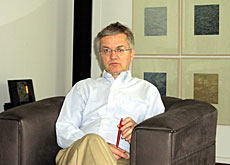
Swiss urged to embrace new EU member states

Switzerland's ambassador to Warsaw tells swissinfo there will be no mass influx of workers from eastern Europe if the country votes to widen the labour market.
André von Graffenried also said Switzerland’s image could suffer if it failed to admit workers from the new European Union member states.
Poland, the largest of the ten new EU member states, has an unemployment rate of 18 per cent. Swiss concerns have focused on the “Polish plumber”, a symbol of the migrant east European tradesman.
Von Graffenried said the vote was not just about labour mobility but about welcoming Poland and the other former communist countries back into Europe.
swissinfo: How have relations with Poland changed since it joined the European Union last year?
André von Graffenried: We have many agreements between Switzerland and the EU. These agreements will also be applied to Poland. One of these is particularly important and that is the extension of the agreement on the free movement of people.
The other important point is that the Swiss government took the commitment to give cohesion help to the new EU member countries – an amount totalling SFr1 billion – and an important part of this will go to Poland.
These are two important points which I hope will help strengthen our relations.
swissinfo: Why is the vote on September 25 on extending the agreement on the free movement of people so important?
A.v.G.: It’s on the one hand a question of the labour market in Switzerland, but on the other it’s a question of principle. The extension of this agreement is a consequence of EU enlargement – if you want of the reunification of Europe – and therefore it’s a response to the ideal of a unified free Europe. I think it’s a very important question of principle, which will also have consequences for our relations to the EU because many agreements are interconnected.
swissinfo: Opinion polls suggest that the vote in September could be close. If the result is rejection, will Switzerland’s image be harmed?
A.v.G.: I think you must also see this in a historical perspective and for Poland membership of the EU is the result of a long process. Poland was partitioned between Russia, Prussia and Austria between 1795 and 1918 before becoming independent again for 21 years. And then you had the Second World War – a time when Poland suffered like no other country – and later it was abandoned to the Soviet Empire.
We are now celebrating the 25th anniversary of [the trade union movement] Solidarity. [Solidarity leader] Lech Walesa and [Polish Pope] John Paul II were the two dominant personalities in this crucial period. The Poles contributed towards overcoming communism and… finally they achieved their objective: joining the EU and the unification of Europe.
So if the Swiss would say ‘no you are not welcome, we don’t want you’, this would of course be humiliating. Switzerland would be the only European country not to extend the agreement to the new EU countries and that would be very badly perceived here.
swissinfo: There was been a campaign to cast a negative light on migrant east European workers. What impact do you think the spectre of the “Polish plumber” has had in Switzerland?
A.v.G.: I don’t think it’s had much impact. What is more of a problem is that people in Switzerland see only the internal situation in their country. There’s a tendency to see the risks rather than the opportunities and to forget that this is a much more important question that will have an effect not only on relations with the new EU countries but with the EU as a whole. But I remain confident that Swiss people will vote for this extension.
swissinfo: As the Swiss ambassador to Poland, do you think you have an important role to play in correcting the negative stereotype of eastern Europe and its workers?
A.v.G.: I don’t know that there is such a negative stereotype. It’s more that Swiss people don’t know Poland or the new EU countries. The Iron Curtain was quite an effective division of Europe, so it’s more the fact that they don’t have any positive personal experience of these countries, so there are no elements that could overcome the fears of unemployment, social dumping and so on.
I see my role as trying to explain to the Swiss people that Poland is a great country with a long history and longstanding relations to Switzerland and that we share the same values. But it’s not perceived as the role of the embassy too much to interfere in referenda in Switzerland.
swissinfo: And yet you don’t mind going on record to say that the Swiss should vote for this accord?
A.v.G.: I think the Swiss have to approve of it and if they don’t it would harm our relations and cast a shadow on the image of Switzerland and have lasting negative effects.
It’s not only a question of the labour market. You must see this in the historical context and the Swiss have to remember that EU enlargement or the reunification of Europe increased stability and security across Europe, including in Switzerland.
swissinfo-interview: Morven McLean in Warsaw
Poland can trace its roots back over 1,000 years.
It has experienced long periods under the domination of neighbouring countries.
Several million people, half of them Jews, died during the Second World War.
In 1989 Poland became the first of the east European countries to overthrow Communist rule.
It joined Nato in 1999 and the EU in May 2004.

In compliance with the JTI standards
More: SWI swissinfo.ch certified by the Journalism Trust Initiative






























You can find an overview of ongoing debates with our journalists here . Please join us!
If you want to start a conversation about a topic raised in this article or want to report factual errors, email us at english@swissinfo.ch.